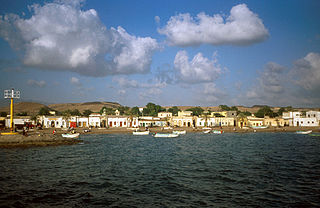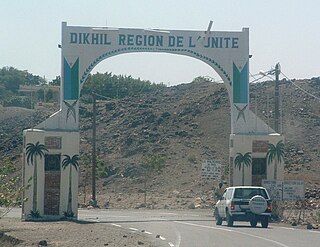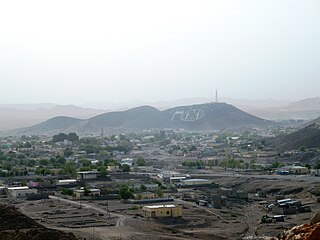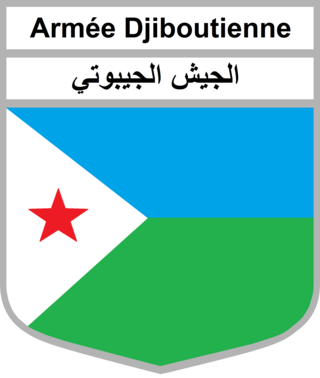 |
|---|
| |
Territorial Council elections were held in French Somaliland on 23 June 1957. [1] The Republican Union won all 30 seats. [2]
 |
|---|
| |
Territorial Council elections were held in French Somaliland on 23 June 1957. [1] The Republican Union won all 30 seats. [2]
The elections were the first held under the loi cadre system, which granted equal voting rights to all residents and scrapped the dual college system. The new electoral system led to the creation of the territory's first real political parties; Harbi Farah Mahamoud formed the Republican Union, whilst Hassan Gouled Aptidon established the Defence of Economic and Social Interests of the Territory (DIEST) party.
Mahamoud (a member of the National Assembly), Aptidon (a member of the Council of the Republic) and Mohamed Kamil (a member of the French Union Assembly) all sought to implement the new system in a way that favoured their own parties; Harbi produced a draft decree in late 1956 that would increase the number of constituencies from three to four, and give 20 of the 32 seats in an enlarged Council to the city of Djibouti. [1]
Kamil, supported by Aptidon, proposed a 30 member Council, with Djibouti having 13 seats and Obock–Tadjoura and Ali Sabieh–Dikhil six each. However, other members of the Union Assembly reduced the number of members to 25. [3]
Ultimately the French Government approved a 30-member Council in which Djibouti had 18 seats and Obock–Tadjoura and Ali Sabieh–Dikhil had six seats each. [4] The right to vote was restricted to native men and French citizens who had lived in the territory for at least a year. [1] [4]
| Party | Votes | % | Seats | |
|---|---|---|---|---|
| Republican Union | 4,180 | 30 | ||
| Defence of Economic and Social Interests of the Territory | 3,494 | 0 | ||
| Total | 30 | |||
| Registered voters/turnout | 11,676 | 68 | ||
| Source: Thompson & Adloff | ||||
| Ethnic group | Seats |
|---|---|
| Issas | 8 |
| Afars | 7 |
| Somalis | 7 |
| Europeans | 5 |
| Arabs | 3 |
| Total | 30 |
| Source: Sternberger et al. [5] | |
Following the elections, Harbi Farah Mahamoud became Vice President of the Government Council (the post of President was held by the Governor). His cabinet included: [2]
Djibouti is a country in the Horn of Africa bordered by Somalia to the southeast, Eritrea and the Red Sea to the north and northwest, Ethiopia to the west and south, and the Gulf of Aden to the east.

Djibouti is a country in the Horn of Africa. It is bordered by Eritrea in the north, Ethiopia in the west and south, and Somalia in the southeast. To the east is its coastline on the Red Sea and the Gulf of Aden. Rainfall is sparse, and most of the territory has a semi-arid to arid environment. Lake Assal is a saline lake which lies 155 m (509 ft) below sea level, making it the lowest point on land in Africa and the third-lowest point on Earth after the Sea of Galilee and the Dead Sea. Djibouti has the fifth smallest population in Africa. Djibouti's major settlements include the capital Djibouti City, the port towns of Tadjoura and Obock, and the southern cities of Ali Sabieh and Dikhil. It is the forty-six country by area in Africa and 147st largest country in the world by land area, covering a total of 23,200 km2 (9,000 sq mi), of which 23,180 km2 (8,950 sq mi) is land and 20 km2 (7.7 sq mi) is water.

Politics of Djibouti takes place in a framework of a presidential representative democratic republic, whereby the executive power is exercised by the President and the Government. Legislative power is vested in both the Government and the National Assembly. The party system and legislature are dominated by the socialist People's Rally for Progress. In April 2010, a new constitutional amendment was approved. The President serves as both the head of state and head of government, and is directly elected for single six-year term. Government is headed by the President, who appoints the Prime Minister and the Council of Ministers on the proposal of the latter. There is also a 65-member chamber of deputies, where representatives are popularly elected for terms of five years. Administratively, the country is divided into five regions and one city, with eleven additional district subdivisions. Djibouti is also part of various international organisations, including the United Nations and Arab League.

Obock is a small port town in Djibouti. It is located on the northern shore of the Gulf of Tadjoura, where it opens out into the Gulf of Aden. The town is home to an airstrip and has ferries to Djibouti City. The French form Obock derives from Arabic "Oboh", deformation of Oboki, a name given to the Wadi Dar'i in its middle part, upstream of its coastal delta.

The People's Rally for Progress is a political party in Djibouti. It has dominated politics in the country since 1979, initially under the rule of President Hassan Gouled Aptidon. Today it is led by President Ismaïl Omar Guelleh and is in a coalition government with Front for the Restoration of Unity and Democracy (FRUD) and other parties. The RPP tends to hold more influence among the Issa population.

Hassan Gouled Aptidon was the first President of Djibouti from 1977 to 1999.

Tadjoura is one of the oldest towns in Djibouti and the capital of the Tadjourah Region. The town evolved into an early Islamic center with the arrival of Muslims shortly after the Hijra. An important port for many centuries, it was ruled by a succession of polities, including the Ifat Sultanate, Adal Sultanate, the Ottoman Empire, France until Djibouti's independence in 1977. Lying on the Gulf of Tadjoura, it is home to a population of around 45,000 inhabitants. It is the third-largest city in the country after Djibouti and Ali Sabieh.

Dikhil is a town in the western Dikhil Region of Djibouti. Lying east of Lake Abbe, It is situated about 122 km (76 mi) southwest of Djibouti City and 12 km (7.5 mi) north of the border with Ethiopia. It serves as the administrative centre of the Dikhil Region, and is home to the Afar and Somali ethnic groups. The town develops gardens and fruit trees.

Ali Sabieh is the second largest city in Djibouti. It is situated about 98 kilometres Southwest of Djibouti City and 10 km (6 mi) north of the border with Ethiopia. It sprawls on a wide basin surrounded by granitic mountains on all sides. Ali Sabieh mild climate makes it a popular tourist destination for Djiboutians. The famous landmark of Ali Sabieh is located near the city.

The Djiboutian Civil War was a conflict in Djibouti, lasting from 1991 to 1994 and resulting in thousands of fatalities. The uneven power sharing between the Issas and the Afars led to the Civil War that ravaged the country for three years.

Front de Libération de la Côte des Somalis was a nationalist organization, and later a guerrilla group, in what is now Djibouti. It competed with the Djibouti Liberation Movement (MLD), supported by Ethiopia. The FLCS was recognized as a national liberation movement by the Organization of African Unity (OAU), which participated in its financing.
Republican Union was a political party in French Somaliland.
Moumin Bahdon Farah was a Djiboutian politician and the President of the Social Democratic People's Party (PPSD). He was Minister of Foreign Affairs from 1978 to 1993 and Minister of Justice from 1993 to 1996. Concurrently, he was a member of the National Assembly of Djibouti.
Ahmed Boulaleh Barreh, also known as Gabayo, is a Djiboutian politician. He is the Vice-President of the People's Social Democratic Party (PPSD) and a member of the National Assembly of Djibouti.

Mahamoud Harbi Farah was a Djiboutian politician of Somali ethnicity. A pan-Somalist, he was the Vice President of the Government Council of French Somaliland from 1957 to December 1958, during Djibouti's pre-independence period.
Omar Farah Iltireh is a politician of the French Territory of the Afars and the Issas, (TAFI) which became the Republic of Djibouti in 1977. He died in France on May 6, 2008.

Dagguirou is a town located in the Dikhil Region of Djibouti. It is situated approximately 212 km (132 mi) western of the nation's capital city of Djibouti, and roughly 95 km (59 mi) northern of Dikhil, the regional capital.

The Djiboutian National Army is the largest branch of the Djibouti Armed Forces and is based in the Djiboutian capital of Djibouti. Djibouti has upgraded its Ground Forces with advanced additions from domestic engineering and modifications. It must operate in mountainous and other rugged terrain, but it must do this without affecting the mechanized capability that is needed to confront regional forces.

Territorial Council elections were held in French Somaliland on 23 November 1958. The result was a victory for the Defence of Economic and Social Interests of the Territory party, which won 25 of the 32 seats.
The Democratic Union Issa (UDI) was an anti-independence political party of French Somaliland and the French Territory of the Afars and the Issas.